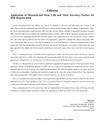 66 citations,
December 2013 in “Nature Cell Biology”
66 citations,
December 2013 in “Nature Cell Biology” Inactive hair follicle stem cells help prevent skin cancer.
 9 citations,
January 2017 in “Elsevier eBooks”
9 citations,
January 2017 in “Elsevier eBooks” Skin's epithelial stem cells are crucial for repair and maintenance, and understanding them could improve treatments for skin problems.
 March 2015 in “Plastic and reconstructive surgery”
March 2015 in “Plastic and reconstructive surgery” Human skin has multiple layers and functions, with key roles in protection, temperature control, and appearance.
 April 2018 in “Journal of Investigative Dermatology”
April 2018 in “Journal of Investigative Dermatology” Ginsenoside Rd may help improve skin aging by increasing collagen in the skin.
 10 citations,
May 2020 in “Dermatology Research and Practice”
10 citations,
May 2020 in “Dermatology Research and Practice” Proteoglycans are important for hair growth, and a specific treatment can help reduce hair loss.
4 citations,
May 2023 in “Cells” Baricitinib and its combination with lonafarnib improve fat cell formation in certain genetic disorders.
 April 2018 in “Journal of Investigative Dermatology”
April 2018 in “Journal of Investigative Dermatology” Removing STAT5 from 3D-cultured human skin cells reduces their ability to grow hair.

Mesenchymal stem cell-derived exosomes significantly increase hair density and thickness in androgenic alopecia patients.
 23 citations,
November 2018 in “Development, Growth & Differentiation”
23 citations,
November 2018 in “Development, Growth & Differentiation” Epidermal stem cells have various roles in skin beyond just maintenance, including forming specialized structures and aiding in skin repair and regeneration.
 April 2018 in “Journal of Investigative Dermatology”
April 2018 in “Journal of Investigative Dermatology” Kaempferol helps skin stem cells grow and may improve skin thickness due to its 3-OH group.
 3 citations,
January 2019 in “Advances in stem cells and their niches”
3 citations,
January 2019 in “Advances in stem cells and their niches” Dermal papilla cells are key for hair growth and color, influencing hair type and size, and their interaction with stem cells could help treat hair loss and color disorders.

Ganoderma lucidum extract may help treat stress-related hair loss.
5 citations,
February 2022 in “Stem cell reports” Thymic stromal lymphopoietin (TSLP) promotes hair growth, especially after skin injury.
 April 2024 in “Biomedicine & pharmacotherapy”
April 2024 in “Biomedicine & pharmacotherapy” Pilose antler extract helps hair grow in mice with a type of hair loss by speeding up the growth phase.
 April 2018 in “Journal of Investigative Dermatology”
April 2018 in “Journal of Investigative Dermatology” Aging reduces skin cell renewal and defense against germs due to TGFbeta, but blocking TGFbeta could help restore these functions.
 65 citations,
July 2020 in “Science Advances”
65 citations,
July 2020 in “Science Advances” Dermal exosomes with miR-218-5p boost hair growth by controlling β-catenin signaling.
 2 citations,
April 2018 in “Journal of Investigative Dermatology”
2 citations,
April 2018 in “Journal of Investigative Dermatology” Frontal fibrosing alopecia shows increased inflammation and JAK-STAT pathway activity without reduced hair proteins.
May 2020 in “Authorea (Authorea)” Olfactory receptors found outside the nose may offer new treatments for diseases like cancer and help in wound healing and hair growth.
 April 2018 in “Journal of Investigative Dermatology”
April 2018 in “Journal of Investigative Dermatology”  June 2023 in “Dermatology and therapy”
June 2023 in “Dermatology and therapy” The Middle East and Africa need better data, treatment consensus, and support for Alopecia Areata.
 3 citations,
November 2020 in “Biological Trace Element Research”
3 citations,
November 2020 in “Biological Trace Element Research” Men with hair loss may lack zinc, copper, and vitamin D; supplements could help.
 97 citations,
March 2009 in “Dermato-endocrinology”
97 citations,
March 2009 in “Dermato-endocrinology” Hormones significantly affect hair and oil gland function in the skin, and more research is needed on skin-related hormone disorders.
 14 citations,
May 2013 in “American Journal of Physiology-endocrinology and Metabolism”
14 citations,
May 2013 in “American Journal of Physiology-endocrinology and Metabolism” Removing myelin protein zero-like 3 in mice leads to better metabolism and resistance to obesity.
 2 citations,
December 2021 in “Asian Journal of Beauty and Cosmetology”
2 citations,
December 2021 in “Asian Journal of Beauty and Cosmetology” The optimal mix of Dendropanax, sea salt, and other extracts can help reduce hair loss.
29 citations,
January 2020 in “Frontiers in endocrinology” Fibrodysplasia ossificans progressiva is a rare genetic disorder that causes extra bone growth and symptoms of premature aging.
 August 2024 in “Journal of Cosmetic Dermatology”
August 2024 in “Journal of Cosmetic Dermatology” Injectable treatments can effectively and safely improve hair growth in adults with androgenetic alopecia.
 February 2024 in “Journal of Cosmetic Dermatology”
February 2024 in “Journal of Cosmetic Dermatology” White hair patch repigmented and hair regrew in a balding patient after treatment with exosomes and laser.
 September 2017 in “Current stem cell research & therapy”
September 2017 in “Current stem cell research & therapy” Mesenchymal stem cells from fat tissue may effectively treat hair loss and help regrow hair.

Certain natural products may help stimulate hair growth by affecting stem cell activity in the scalp.
 35 citations,
March 2014 in “British Journal of Dermatology”
35 citations,
March 2014 in “British Journal of Dermatology” Hair loss in male pattern baldness involves muscle degeneration and increased scalp fat.


























